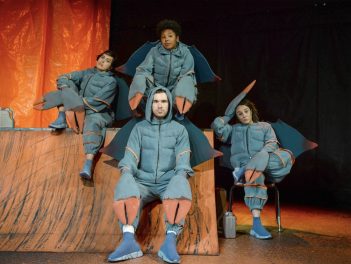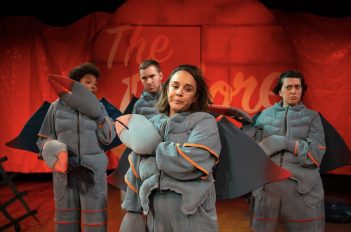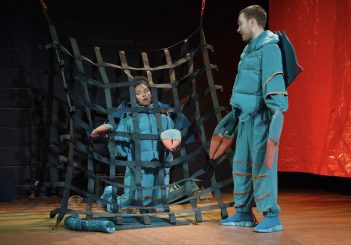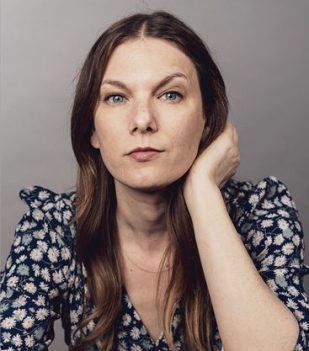By Robert St. Martin
Los Angeles, CA (The Hollywood Times) 7/19/23 – I just can’t say enough about how much I enjoyed the new play “Crabs in a Bucket” which premiered at the Echo Theatre Company this past weekend. This brilliant satire of “crab mentality” especially on oppressed communities stems from a Mexican saying about how people much like crabs will pull others back down if they try to escape from the drudgery of their daily existence. Alana Dietze directs this amazing play by Bernardo Cubría for a six-week run at Echo’s home theatre at the Atwater Village Theatre. The play premiered this past weekend of July 15 – 17 and runs through August 21. Get yourself a ticket to see this play that is poetry in motion and resonates with so many truths about human existence.

Crabs in a Bucket stars Jordan Hull, Anna LaMadrid, Xochitl Romero and Michael Sturgis – and they play four crabs living in a shucking bucket. Yes, they are people playing crabs on stage in cleverly-designed crab costumes in a very theatrical stage-set that resembles a huge orange shucking bucket. The novelty of this production only serves to amplify its message about how the people in a community often refuse to support each other for fear that someone else might get what they want.

Cubría set out to write a play a satire of a system that makes him incredibly sad about the “crab mentality” so he decided to explore the metaphor literally. When he sat down to write the first draft five years ago, Cubría recalls, “I was thinking about the crab mentality conversation in the Latinx theatre community. Who creates the system where one person makes it so no one else can get big?” The story quickly escaped any insular confines and addressed broadly universal themes, “What happens when bitterness and resentment win out? We are all idealistic at some point but then resentment settles in.”

The language of the play echoes the worldview of these crabs in a shucking bucket, following this trope to its crab-like end. Amargo (Xochitl Romero) and Pootz (Anna La Madrid) are bitter crabs who spend their days “talking chit” about the crabs that got out, the ones who couldn’t take it, and the losers who still live among them. Young Beb (Joran Hull) is the newcomer who arrives filled with optimism and hope for change. Can Beb help Amargo and Pootz achieve their life-long dream of “getting the shuck out”? Or will they prove to be their own worst enemies and continue to hold each other and everyone else back?

Amargo has been in the bucket the longest and is the most jaded and bitter of the four crabs – and the one who believes they are the best and most deserving of escape. Pootz is Amargo’s sidekick – a loyal, devoted and loving friend who adores Amargo but isn’t very bright. When playwright Cubría he originally wrote Amargo, a jaded and crabby protagonist as a reflection of his own mentality, he now views the character as a tragic figure. Amargo has control of the most insightful language and even ventures to name their predicament as “social constructivism.”

Then Young Beb arrives. “Beb is this young, idealistic – like, just landed in Hollywood or New York City and believes that they are going to be the next big thing, and more than that, believes they can save the world,” Dietz said. “They have the answers to make this place more loving and beautiful and utopian.” Beb as embodied by Jordan Hull is a tour de force on stage – trying to figure out how, if the crabs all worked together, they could help each other get out of the shucking bucket. When tide comes in, Beb tries to get the Amargo and Pootz to climb out but in their struggle, they end up pushing each other down. And suddenly they see a fourth crab named Mamon about whom Amargo had bad-mouthed earlier for leaving the bucket.
Mamon (Michael Sturgis) is back in the bucket, after having been outside. The others are curious about what he has seen and experienced, but Mamon refuses to reveal what happened to him that made him return to the bucket. Beb keeps pushing Mamon to talk but he replies: “It’s too complicated.” Eventually Mamon does reveal the truth of life outside the bucket and it turns out to be ultimately disappointing. The drive to escape the bucket is what motivates Beb and that is why that crab is hoping to join Mamon outside of the bucket in the near future. Beb pins their dreams on the outside. Pootz will ultimately give up on such a dream. The metaphor written-large certainly applies to more than just the Mexican-American experience in theatre and in real life: It echoes what happens to most of us who once harbored dreams of “making it big” in youth and discovering later than such hopes are usually squashed by the reality of how the system works.

Director Alana Dietze has directed plays by Cumbía during the COVID pandemic. She says that Cumbría describes all his works as “clown plays,” which the characters having a clear, specific language that reveals their emotional masks. The physicality of movement by the actors as crabs is choreographed to illustrate how they react to each other. That makes for much of the humor of the play. Dietze says that she worked with several experts in clowning, movement (Tristan Waldron) and fight choreography (Ahmed Best).
Movement in this play is a key component showing how the crabs show pain, resentment, and also hope. The actors were given clowning exercises to help them create the language and world of being a crab-clown. “These are people that are playing crabs. What does that mean? How do you move as a crab when you don’t have claws and 10 legs? Our costumes do provide some of those elements, but they’re not entirely literal. They have claws on their hands and they’re wearing a shell on their back, but the costume is also inspired by streetwear.”
Perhaps the novelty of seeing actors dressed as crabs on stage is beyond what I expected but most certainly the clownish aspect of the actors’ performances engages us with the fond memory of children’s theatre as well as the surreal absurdity of the clownish characters’ situation. Cubría concedes that Samuel Becket is one of his major influences and certainly there is an aspect of Waiting for Godot in the endless wait of these crabs in the bucket. Playwright Bernardo Cubría asks: “What happens when we can’t be happy for the success of others?” “Sometimes, in communities where there are limited opportunities, we think, ‘if he gets a slot, there won’t be one left for me,’ and we get down on each other. Why can’t we support one another? Whenever oppressed groups come together, we win.”
Cubría is a Mexican-born playwright and screenwriter. His The Play You Want was the recipient of the Boulder Ensemble Theatre Company’s 2020 Generation Award as well as Portland Oregon’s Milagro Theatre’s 2020 Ingenio Award for New Play by a Latinx Playwright. In 2019, Cubría was nominated for a trifecta of Ovation, Stage Raw and Los Angeles Drama Critics Circle Best Playwright awards for his play The Giant Void In My Soul. He has written a feature screenplay for a film Like It Used to Be, which is being directed by Gina Rodriguez.
Crabs in a Bucket opened on July 15 and runs through August 21. Performances are on Fridays and Saturday at 8 PM; Sundays at 4 PM; and Mondays at 8 PM. Tickets are $34 on Fridays, Saturday and Sundays. All Monday night performances are pay-what-you-want. The Atwater Village Theatre is located at 3269 Casitas Avenue in Los Angeles, CA 90039. For more information and to purchase tickets, call (310) 307-3753 or to go to: www.EchoTheatreCompany.com.




